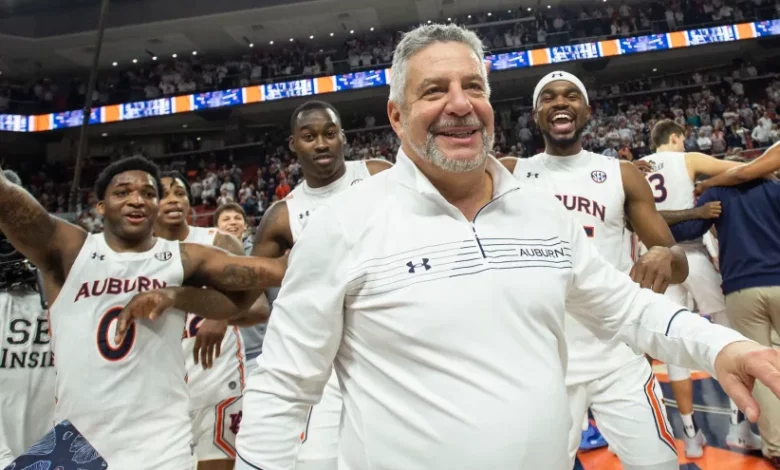Coach Bruce Pearl’s moral courage transcends basketball

Coach Bruce Pearl’s Moral Courage Transcends Basketball
Bruce Pearl, the head coach of the Auburn Tigers men’s basketball team, has become a beacon of moral courage not only for his efforts on the basketball court but also for the values he embodies off it. Known for his passionate coaching style, energetic sideline antics, and exuberant personality, Pearl has built a reputation as one of college basketball’s most vibrant and impactful figures. Yet, while his coaching success—leading Auburn to unprecedented heights—is significant, it’s his moral courage that stands as a testament to his character.
Coach Pearl’s journey transcends the sport he loves, offering a rare look at a figure who not only motivates athletes but also inspires through integrity, resilience, and the ability to navigate personal challenges with grace and accountability. Pearl’s moral courage goes beyond mere adherence to ethical standards; it’s about the consistent commitment to doing what is right, even when it’s unpopular, difficult, or professionally costly. Whether he is addressing personal mistakes, advocating for the well-being of his players, or standing firm on issues of justice, Pearl’s example reminds us that moral courage isn’t limited to grand gestures but often emerges in the everyday decisions that reflect a person’s values and priorities.
This article will explore the various dimensions of Coach Bruce Pearl’s moral courage, focusing on his transparency, accountability, advocacy for others, and personal growth. As we examine the intersection of these qualities with his career and life, we will also reflect on how his leadership extends far beyond the basketball court, making him a figure who offers profound lessons for people in all walks of life.
1. Transparency and Accountability: Owning His Mistakes
One of the defining features of Bruce Pearl’s moral courage is his transparency and willingness to take responsibility for his past mistakes. In the world of high-profile sports, coaches are often shielded by their success and public image, sometimes allowing their actions to go unchecked. However, Pearl has consistently taken a different approach—acknowledging his mistakes and using them as opportunities for growth.
In 2011, Bruce Pearl found himself embroiled in a scandal that led to significant consequences for both him and his program. As head coach of the University of Tennessee, Pearl was found to have provided false and misleading information to the NCAA during an investigation into recruiting violations. The fallout was swift, as the university decided to fire him, and Pearl was handed a three-year show-cause penalty from the NCAA, which effectively barred him from coaching at the college level for a period.
Rather than deflect or hide from the situation, Pearl took full responsibility for his actions. He admitted his mistakes without reservation and faced the consequences head-on. In interviews and press conferences following his departure from Tennessee, Pearl never shied away from confronting the gravity of his situation, emphasizing that he was the one responsible and that the mistakes were his alone. While others in his position might have blamed external circumstances or made excuses, Pearl stood firmly on the idea that he was accountable for the program’s shortcomings.
In the years that followed, he not only worked to rebuild his career but also rebuilt his reputation. After serving his show-cause penalty, he was hired as the head coach at Auburn University in 2014. Many viewed this move as an act of redemption for a coach who had once been considered among the best in the business but had faltered under scrutiny. Instead of merely focusing on his own professional recovery, Pearl used the experience as an opportunity to teach others the importance of accountability and resilience.
His ability to move past this difficult chapter in his life also taught his players and colleagues a valuable lesson: success is not solely defined by victory on the court but by how one handles adversity. By openly acknowledging his past and showing the courage to continue to lead, Pearl demonstrated the power of humility, something that is often overlooked in high-stakes environments. For him, transparency was not a weakness but a strength that helped him grow both personally and professionally.
2. Advocacy for Others: Using His Platform for Good
Throughout his career, Bruce Pearl has consistently used his platform to advocate for causes that are larger than basketball. Whether speaking out on social justice issues, advocating for mental health awareness, or supporting diversity and inclusion, Pearl has made it clear that his moral courage is not confined to his role as a basketball coach.
One of the areas where Pearl’s advocacy shines is his support for mental health. College basketball players often face intense pressure, not just to perform on the court but to balance academics, social expectations, and the demands of being a public figure. Understanding this reality, Pearl has used his position to speak out on mental health issues within the sports world. He has made it clear that he believes in creating a space for athletes to discuss their mental health challenges without fear of judgment or stigma.
In a world where athletes are often expected to push through pain, discomfort, and emotional struggles, Pearl has been a vocal advocate for mental health awareness. He recognizes that the well-being of his players extends beyond the physical realm and that mental health is an essential aspect of their overall health. By creating an environment that prioritizes mental well-being, Pearl encourages his players to take care of themselves holistically, providing them with the tools and support they need to navigate the complexities of life as student-athletes.
Beyond mental health, Pearl has also used his voice to speak out on issues of racial justice. In the wake of events such as the tragic murder of George Floyd in 2020 and the subsequent calls for racial justice across the country, Pearl was quick to publicly acknowledge the need for change and progress in society. As a coach at a predominantly white institution, Pearl understood the importance of using his platform to speak up about the systemic racism that exists in society and how it impacts the lives of Black Americans, including many of his players. His willingness to speak on these issues—often at the risk of alienating some segments of the fanbase—showcased a commitment to what was right, rather than what was easy.
In these efforts, Pearl’s moral courage is rooted in his belief that sports can be a vehicle for social change. He recognizes that the influence of sports figures can transcend the game itself and affect the larger cultural and societal landscape. For Pearl, advocating for social justice isn’t just about raising awareness but about using his position to help foster an environment of change, not just for his players but for the broader community.
3. Personal Growth and Redemption: A Lesson in Resilience
Bruce Pearl’s moral courage also lies in his remarkable capacity for personal growth and redemption. His ability to learn from past mistakes, evolve as a leader, and continue to thrive in his profession demonstrates a resilience that resonates with many people outside the world of sports.
Following his tenure at Tennessee, Pearl faced not only professional setbacks but also personal challenges that tested his integrity. As he returned to coaching, he made a deliberate effort to grow both as a coach and as an individual. His time at Auburn has been marked by an increased focus on his relationship with his players, the importance of family values, and fostering a culture of trust and respect within his program.
Pearl’s personal growth is most evident in his evolving approach to leadership. While he has always been known for his energy, enthusiasm, and ability to motivate, his approach has matured over time. He now emphasizes the importance of teaching life lessons, developing character, and mentoring young men beyond the basketball court. His ability to connect with players on a personal level—whether they are struggling with personal issues or navigating the pressures of college sports—is a direct result of his growth as a leader who values both performance and character.
His coaching philosophy extends beyond simply winning basketball games. While Pearl is undoubtedly competitive and strives for excellence, he prioritizes his players’ well-being, development, and the building of lasting relationships. This commitment to holistic development is a key component of his moral courage. He is not simply a coach who wins games but a mentor who shapes the lives of young men, helping them navigate the complexities of both their athletic and personal journeys.
4. Creating a Legacy of Integrity: Teaching His Players to Stand Tall
Perhaps the most important aspect of Bruce Pearl’s moral courage is the legacy he is creating for his players. Pearl’s leadership goes beyond tactical advice or X’s and O’s on the court; he is deeply invested in teaching his players about the importance of integrity, responsibility, and character. His influence has extended far beyond Auburn University, as many of his former players have gone on to become leaders in their own right.
By fostering a culture of honesty, accountability, and courage, Pearl teaches his players the importance of standing up for what is right, even when faced with adversity. Whether it’s supporting teammates, taking responsibility for mistakes, or confronting difficult societal issues, Pearl’s example sets a high standard for the men he coaches.
One of the most poignant aspects of Pearl’s legacy is his ability to inspire his players to use their platform for good. His own example as an advocate for change and his public stance on important issues serve as a model for young athletes who may one day be in positions to influence the world around them. Through his leadership, Pearl instills the idea that success in life is not just about wins and losses but about making a positive difference in the lives of others.









